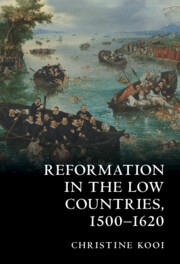Book contents
- Reformation in the Low Countries, 1500–1620
- Reformation in the Low Countries, 1500–1620
- Copyright page
- Dedication
- Contents
- Illustrations
- Maps
- Acknowledgments
- A Note on Nomenclature
- Abbreviations
- Introduction
- 1 The Netherlands in the Early Sixteenth Century
- 2 Inchoate Reformation
- 3 The Confessional Turn
- 4 War
- 5 Schism
- Conclusion
- Bibliography
- Index
3 - The Confessional Turn
Published online by Cambridge University Press: 02 June 2022
- Reformation in the Low Countries, 1500–1620
- Reformation in the Low Countries, 1500–1620
- Copyright page
- Dedication
- Contents
- Illustrations
- Maps
- Acknowledgments
- A Note on Nomenclature
- Abbreviations
- Introduction
- 1 The Netherlands in the Early Sixteenth Century
- 2 Inchoate Reformation
- 3 The Confessional Turn
- 4 War
- 5 Schism
- Conclusion
- Bibliography
- Index
Summary
This chapter traces the evolution of reformist ideas in the Netherlands during the middle decades of the sixteenth century. It describes a confessional turn – that is, the gradual emergence of three principal streams of religious reform: Mennonite, Reformed and Catholic. The Mennonite or Doopsgezinde stream arose out of Anabaptism; after the judicial reaction to the Muenster kingdom, Menno Simons and his followers eschewed the radicalism of the Melchiorites and turned inward, creating self-segregated communities focused on internal piety and moral reform. Meanwhile Reformed Protestantism made its way into the Low Countries and gained a substantial following by the 1560s. Both Mennonites and Reformed would develop confessional identities distinct from each other, including their own martyrologies and Bible translations. Meanwhile, Catholic reform came to the region through the Tridentine canons and the reorganization of the region’s bishoprics.
- Type
- Chapter
- Information
- Reformation in the Low Countries, 1500-1620 , pp. 74 - 104Publisher: Cambridge University PressPrint publication year: 2022

